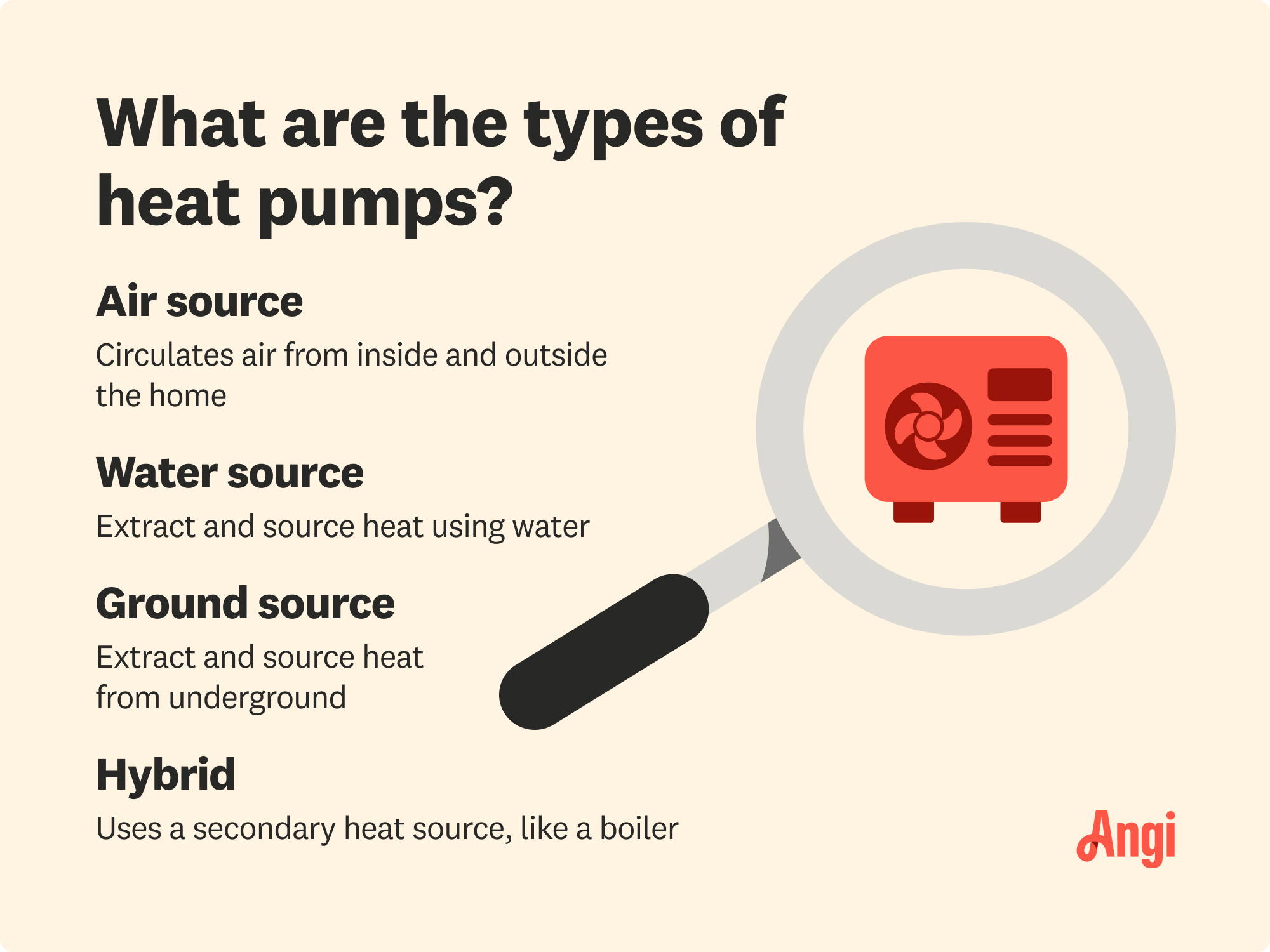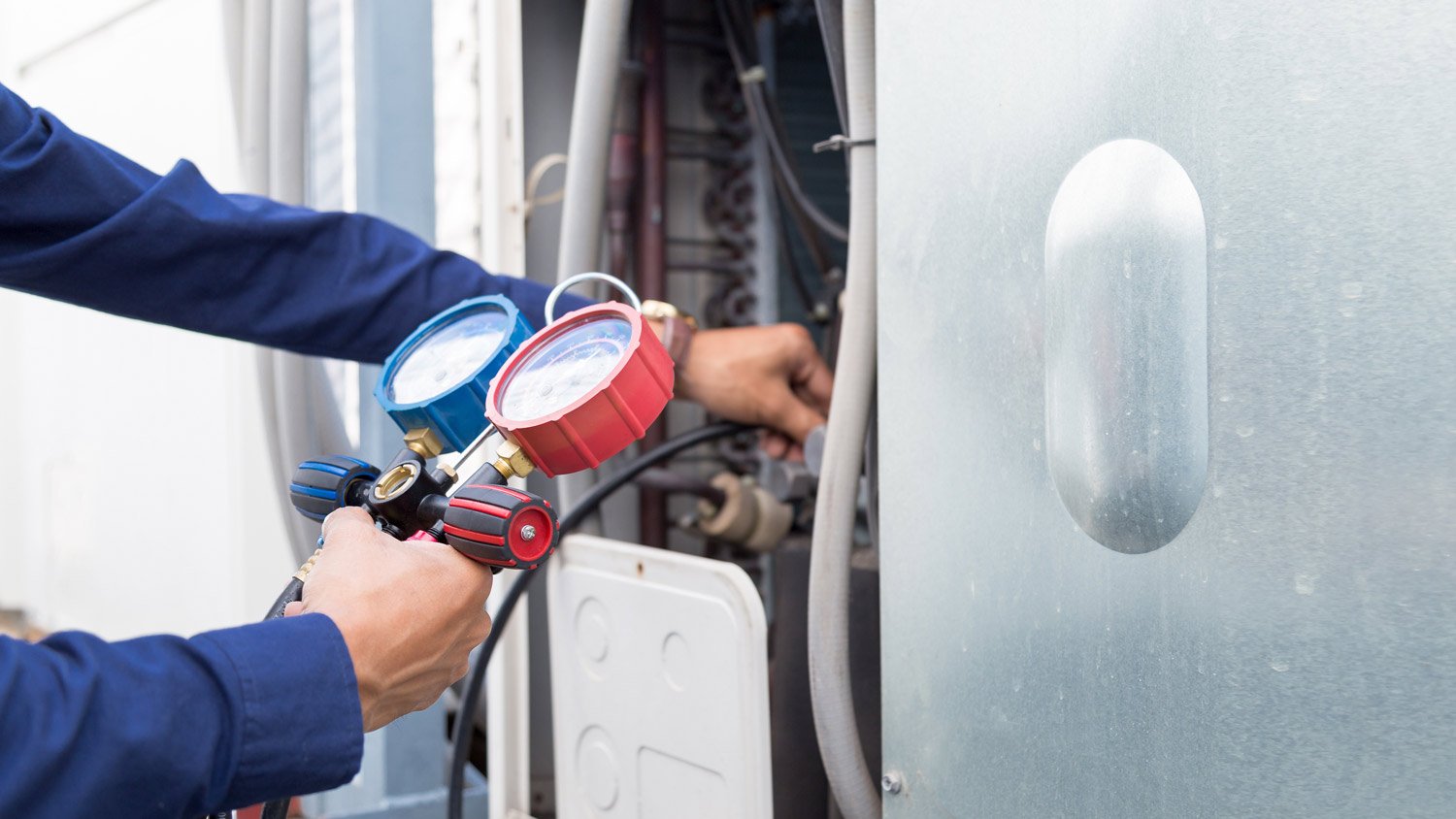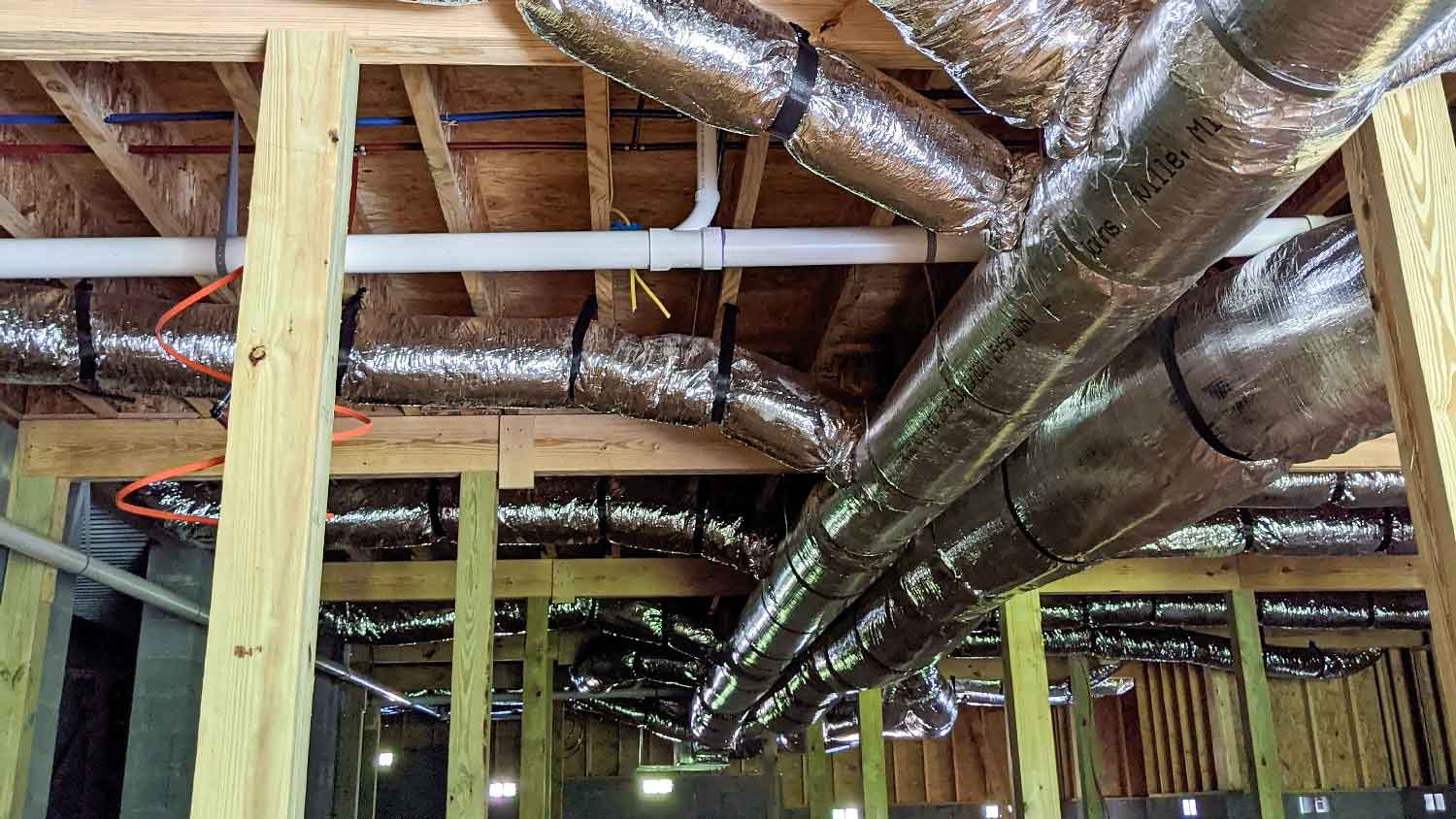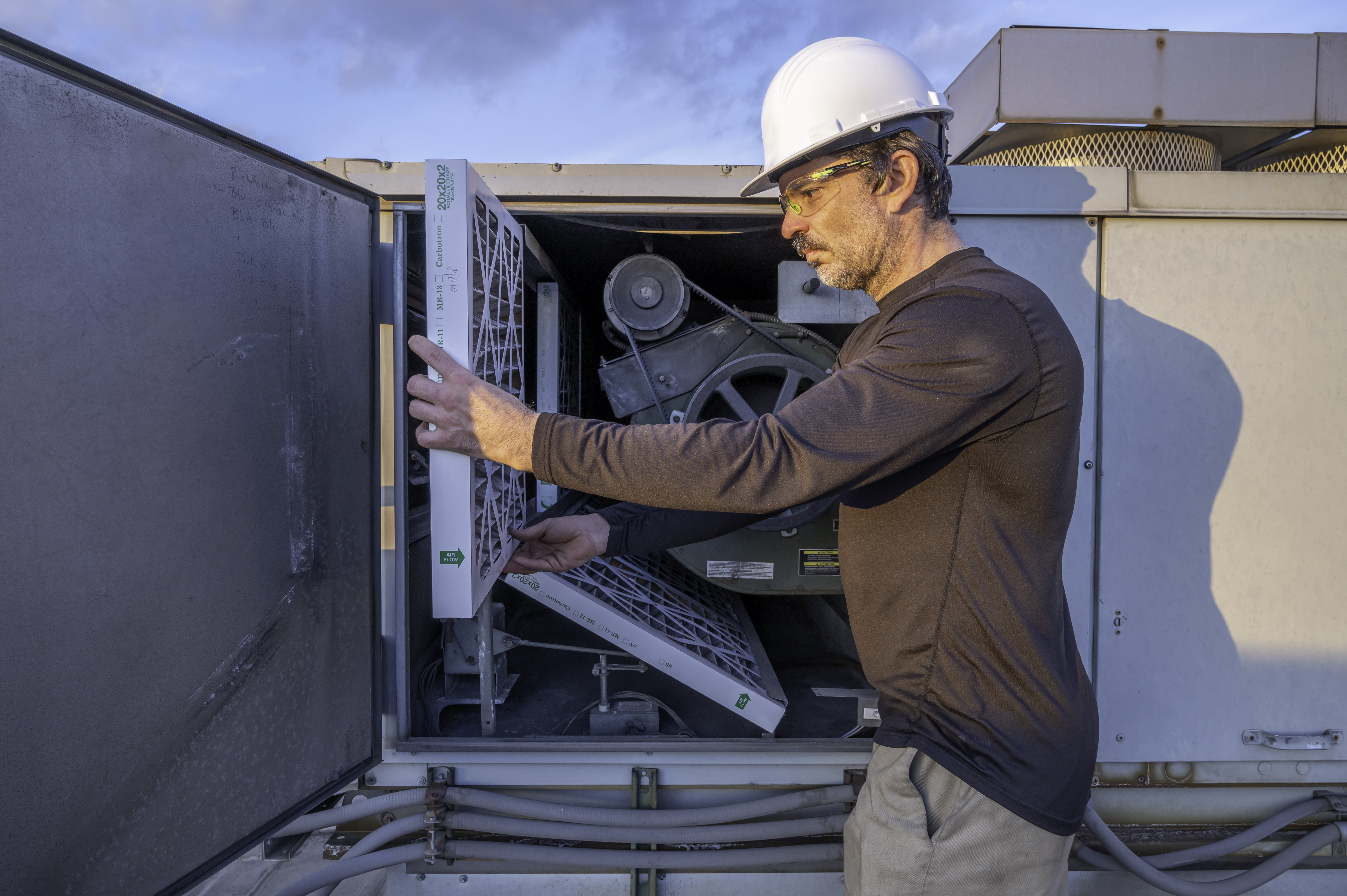
Explore how much an AC compressor costs to install based on cost factors like it’s type, brand, size, and local labor rates.
Both systems will keep you warm, but there are pros and cons to each


A heat pump is an efficient heating and cooling system, while furnaces are only heat systems.
Heat pumps are ideal for temperate climates.
Furnaces provide more warmth, ideal for cold climates.
Furnaces cost less upfront but may cost more over time.
Both systems require professional installation and maintenance.
When it comes to keeping your home cozy on a freezing winter day, it all boils down to your heating system. So how do you determine whether you need a heat pump vs. a furnace? For some homes, a heat pump is an extremely efficient, cost-effective heat source. In others, a furnace makes far more sense in terms of cost and effectiveness. You’ll need to consider several different pros and cons of heat pumps and furnaces before making your decision.
The primary difference between a heat pump and a furnace is that while a furnace can only heat your home, a heat pump provides heating and cooling. If you opt for a furnace, you’ll also need to install an air conditioning system for your cooling needs.
Keep in mind that while a heat pump can heat your home, it may not provide sufficient heat in extremely low temperatures. However, a furnace tends to perform better in frigid climates. When considering cost, a furnace costs less upfront but a heat pump might save you money in the long run by lowering your energy bills. Consult a local heat pump professional to determine whether that system is the best option for your home.

A heat pump is a common type of HVAC system that both heats and cools your home using electricity. When it’s warm outside, a heat pump moves heat from the indoors to the outside. In the winter months, a heat pump draws heat from outside air or the ground and pushes it inside your home. There are several types of heat pumps to choose from; each are the same in function but vary slightly in how they extract heat.
| Pros | Cons |
|---|---|
| Doubles as a heating and cooling system | Less effective in cold climates |
| Better humidity control | Higher upfront costs |
| Reduces energy use | More difficult to maintain |
Best for:
Households looking to reduce energy usage
Homes in warm, humid areas
Homes in non-coastal regions
There are many benefits to using a heat pump, whether you opt for an air-source heat pump or a geothermal heat pump. According to the U.S. Department of Energy, a geothermal heat pump can reduce energy use by 30% to 60%, and an air-source heat pump saves about 50% electricity compared to an electric furnace or baseboard heater. Plus, heat pumps can serve as both a heating and a cooling system.
A heat pump, however, isn’t a good fit for every house. That’s why it’s important to consider potential drawbacks before deciding if this type of HVAC system is right for your home. For one, a heat pump is less effective in cold climates. For people living in coastal regions, the salty air can shorten the lifespan of a heat pump by corroding the metal over time. Additionally, heat pumps often require higher installation costs and take more effort to maintain.
A furnace heats cool indoor air then distributes it through the ductwork to the individual rooms in your home. While a furnace doesn’t provide cool air like a heat pump does, it still plays a vital role during warmer months. In the summer, your AC system relies on certain components of your furnace to circulate cool air throughout the home.
| Pros | Cons |
|---|---|
| Better performance in cold climates | Less humidity control |
| Long-lasting | Cannot provide cool air in summer |
| Less maintenance | Higher lifetime costs |
Best for:
Homes in colder climates with low humidity
Homeowners looking for a low-maintenance system
Those who aren’t sensitive to dry air
For households in cold climates or for people who seem to always be cold, a furnace may be a better choice. Furnaces tend to provide hotter air than a heat pump, which can help make any room feel extra-toasty, even on the coldest days of the year. While furnaces can’t switch to provide cool air in the summer, that means you’ll need to use your furnace less often, leading to fewer maintenance needs throughout its life.
While a furnace is a high-performance system, it comes with drawbacks. Furnaces tend to release hot, dry air, so you may need to invest in a humidifier to counteract its drying effect.
Additionally, while modern furnaces do have added safety features, these systems can be less safe than a heat pump system, as they can leak deadly gasses, like carbon monoxide, or pose fire risks without proper care.

When it comes to heating your home, both a heat pump and a furnace can create a respite from the cold. But your short- and long-term budget, ability to tackle maintenance, and even the appearance of each system may determine which option is right for you.
| Heat Pump | Furnace |
|---|---|
| Higher upfront cost | Lower upfront cost |
| Lower lifetime costs | Higher lifetime costs |
| More sustainable | Easier to maintain |
| Provide heating and cooling | Better for cold climates |
| Safer | Longer lifespan |
While you probably aren’t expecting a beautiful heating system, there are some appearance factors you might consider when deciding between a heat pump and a furnace. A geothermal heat pump may have a large unit that goes inside the home, like a furnace, while an air-source heat pump unit goes outside. Some types of heat pumps, like ductless mini-split heat pumps, also have smaller units that go in each room, and these may be an eyesore.
By comparison, a furnace unit, although larger, will go inside the home, typically somewhere guests won’t see it, like in a utility closet or a basement.
Typically, you won’t need to kick on the furnace until late fall or early winter, when temperatures start to drop drastically. Because of this, the system and its parts don’t wear down very quickly.
You may use your heat pump all year long because it can provide both warm and cool air. With more use comes more wear and tear, impacting the durability of your heating and cooling system.
A new furnace costs between $2,815 and $6,810 on average. Electric furnaces tend to cost the least upfront, while oil furnaces usually cost more than other furnace types.
By comparison, a heat pump costs about $4,200 and $7,630 on average, with mini-split systems costing the least, and geothermal or solar systems costing the most.
A furnace costs less upfront, but heat pumps have some advantages to consider. Over time, because it is so efficient, a heat pump may cost you less in monthly heating and cooling bills. The heat pump can also replace your cooling system, so you’re buying both a heating and cooling system in one unit. Heat pump installations may also be eligible for energy-related tax incentives.
Ultimately, a heat pump may cost less over its lifetime compared to a furnace, but total costs will vary based on your home size, type of heating system, usage, and other factors.
When it comes to installation, you should leave both heat pumps and furnaces to the pros. Heat pumps may require digging for geothermal systems or handling refrigerants for mini-split systems. When digging, you run a risk of hitting utility lines, while handling refrigerants puts you at risk of exposure to gasses that may lead to lung damage, brain damage, or death.
When it comes to furnaces, you could be dealing with gas, oil, electrical wires, or a combination of these elements, and improper installation can lead to house fires and shockingly high energy bills.
Instead, hire a local furnace installation pro to install your new furnace, or reach out to a heat pump installer near you to get started on your heat pump project.
Similarly, when considering heat pumps vs. furnaces, potential repair work may be top of mind. But with either of these systems, repairs are best left to the pros.
Common heat pump problems may include faulty wiring, leaking refrigerant, or even mold or pests. Typical furnace problems may include overheating, damaged parts, or gas leaks.
You should always have a professional come take a look when you suspect something’s wrong with your heating system. Trying to fix any of these issues without proper training will increase your risk of electric shock, burns, and exposure to deadly gasses.
Taking care of a furnace is pretty straightforward for homeowners. At least every 90 days, you should change the furnace filter, and you’ll need to schedule a professional inspection and cleaning at least once per year.
With a heat pump, you’ll need to put a little more elbow grease into it. Heat pump maintenance may involve scraping away ice, snow, and leafy debris from an outdoor unit, replacing filters each month, and cleaning the coils and fans on the heat pump unit. Additionally, this heating system will need annual inspections and tune-ups from a pro.
The length of life for a heat pump vs. a furnace depends on how well you keep up with maintenance. A well-maintained furnace has a lifespan of about 15 to 20 years or more, with electric furnaces and some gas furnaces lasting up to 30 years.
Heat pumps have a lifespan of about 15 years with proper maintenance, but your climate has a huge impact on the unit’s longevity. The salty air of coastal climates can lead to more wear and tear on the system, shortening the heat pump lifespan to under 10 years. If you live in a dry climate and keep up with maintenance, your system could last for about 15 years.
Heat pumps are significantly more efficient than furnaces, whether you compare a heat pump vs. a gas furnace, an oil furnace, or an electric furnace. According to MIT Technology Review, a modern heat pump may reach 300% to 400% efficiency, so the unit produces far more energy than it is consuming.
Of course, these systems still use refrigerants, which can release greenhouse gasses if there’s a leak. Keeping up with regular cleaning and maintenance will help keep the heat pump as efficient and eco-friendly as possible.
From average costs to expert advice, get all the answers you need to get your job done.

Explore how much an AC compressor costs to install based on cost factors like it’s type, brand, size, and local labor rates.

A mini-split allows for zoned cooling, helpful for cooling spaces like garages. Learn the cost to install a mini-split unit in a garage with this guide.

Discover the cost to install ductwork. Learn about average prices, cost factors, and tips to save money on your ductwork installation project.

Wondering who to hire for swamp cooler installation? Learn when to call an HVAC contractor, electrician, or handyperson, and what to expect.

Not sure which kind of thermostat is best for your home? Here’s an overview of three types of thermostats so that you can choose the right one for you.

Not sure who to hire to install radiant floor heating? Learn which pros handle radiant floor heating installation and how the work comes together.